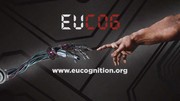 | EUCog2017: EUCognition 2017 Meeting University of Zurich Zurich, Switzerland, November 23-24, 2017 |
| Conference website | http://www.eucognition.org/index.php?page=2017-zurich-general-info |
| Submission link | https://easychair.org/conferences/?conf=eucog2017 |
| Abstract registration deadline | September 17, 2017 |
| Submission deadline | September 17, 2017 |
For over a decade, the EUCognition network (EUCog) has brought together academic researchers and industrial partners with a common interest in the design and construction of artificial cognitive systems in ways that are informed by, or attempt to explain, biological cognition. The emphasis is on systems that are autonomous, robust, flexible and self-improving in pursuing their goals in real environments. EUCog not only includes researchers who use insights from natural cognition in creating artificial cognitive systems for robotic and other technical applications but also those interested in using artificial cognitive systems to understand natural cognition. The field includes computer science, robotics, cognitive science, neuroscience, and philosophy as its core disciplines.
EUCog will hold its next meeting this coming November in Zurich. The focus of the event will be community building, as well as presenting cutting-edge research in the field of artificial cognitive systems. The meeting is open to all: one need not be a past or current member of the EUCog network to attend.
Submission Guidelines
We invite submission of Abstracts to be presented at the conference as posters or short talks. The abstracts can describe original work, but also an opinion or a summary of previous work, as long as these are relevant to the topic of the confernece and of high intellectual and scientific quality. All abstracts will be reviewed by the program committee.
- Short abstracts of at most 200 words
- Extended abstracts of 600-1200 words without references (1-3 pages)
List of Topics
General Theme: "Learning. Beyond Deep Neural Networks".
This year's conference deals with the topic of learning in artificial cognitive systems. The computational framework of Deep Neural Networks (DNNs) has been very successful in recent years because of the availability of immense computing resources and labeled datasets. The DNNs solve several problems in the field of Artificial Intelligence, such as speech and images recognition. However, despite of the impressive performance in some domains, there are fields of machine intelligence, where DNNs may not be the ultimate solution. One such field is cognitive robotics, which is central to the EUCognition interests. The limitations in terms of time, computing power, autonomy, perception, and availability of supervising input, characteristic of autonomous robotic systems that can support humans in their daily life and in hazardous environments, limit application of the computation-, data-, and energy-“hungry” DNNs in this field. Moreover, to be able to work flexibly and adaptively in real-world environments, shared and co-habited with humans, robotic systems may require completely different types of learning, which work based on the sensory information acquired by the system in a closed behavioral loop, instead of the labeled data. These learning processes have to be real-time (fast) and tightly coupled to other sensorimotor and cognitive processes, such as perception, attention, memory formation, skill learning, or decision making. The EUCog2017 conference will spawn a debate on the topic of machine learning techniques in "embodied" (i.e. robotic) cognitive systems. We hope to highlight the challenges that the connectionist (neural network-based) controllers in general and learning architectures in particular face in robotics.
Key issues to be explored include, but are not limited to:
- Successes and limitations of deep learning in robotics and cognitive systems
- Cognitive architectures that allow us to overcome limitations of deep learning
- Cognitive systems in design of (machine) learning systems
-
Integration of deep learning in cognitive architectures
Committees
Program Committee
- Vincent C. Müller, Yulia Sandamirskaya, Ron Chrisley, Markus Vincze, Matej Hoffmann, Florian Röhrbein, Pablo Gil
Organizing committee
- Yulia Sandamirskaya
- Vincent C. Müller
- Ron Chrisley
- Elisa Donati and Raphaela Kreiser
Venue
The conference will be held at the University of Zürich, in the Aula of the Rämi-Building, Rämistrasse 59, 8001, Zürich, Switzerland
Contact
All questions about submissions should be emailed to Yulia Sandamirskaya (ysandamirskaya@ini.uzh.ch) and/or Vincent Müller (vmueller@act.edu).
Sponsors
Support from UZH Graduate Campus via a GRC Grant is gratefully aknowledged
